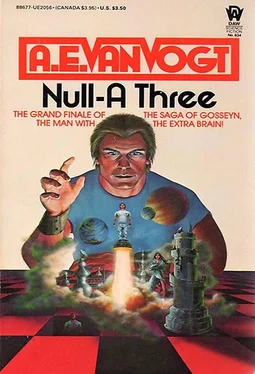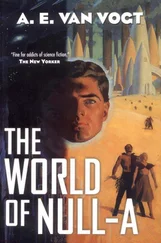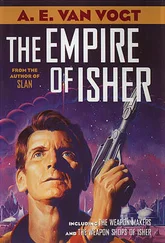Alfred Van Vogt - Null–A Three
Здесь есть возможность читать онлайн «Alfred Van Vogt - Null–A Three» весь текст электронной книги совершенно бесплатно (целиком полную версию без сокращений). В некоторых случаях можно слушать аудио, скачать через торрент в формате fb2 и присутствует краткое содержание. Жанр: Фантастика и фэнтези, на английском языке. Описание произведения, (предисловие) а так же отзывы посетителей доступны на портале библиотеки ЛибКат.
- Название:Null–A Three
- Автор:
- Жанр:
- Год:неизвестен
- ISBN:нет данных
- Рейтинг книги:3 / 5. Голосов: 1
-
Избранное:Добавить в избранное
- Отзывы:
-
Ваша оценка:
- 60
- 1
- 2
- 3
- 4
- 5
Null–A Three: краткое содержание, описание и аннотация
Предлагаем к чтению аннотацию, описание, краткое содержание или предисловие (зависит от того, что написал сам автор книги «Null–A Three»). Если вы не нашли необходимую информацию о книге — напишите в комментариях, мы постараемся отыскать её.
Null-A 3 is destined to become an instant classic — a mind boggling galaxy-spanning adventure!
Null–A Three — читать онлайн бесплатно полную книгу (весь текст) целиком
Ниже представлен текст книги, разбитый по страницам. Система сохранения места последней прочитанной страницы, позволяет с удобством читать онлайн бесплатно книгу «Null–A Three», без необходимости каждый раз заново искать на чём Вы остановились. Поставьте закладку, и сможете в любой момент перейти на страницу, на которой закончили чтение.
Интервал:
Закладка:
The additional information was that the people on Venus had not been heard from since the attack by Enro s forces a few months before.
On that point, Gosseyn had his own thoughts—which he had no intention of sharing.
The fact was that the non-Aristotelian millions of Venus had, for some time now, been emigrating. Groups of them were being taken out to the inhabited planets of, principally, the Interstellar League. There, they were assigning themselves the task of bringing the philosophy and methods of General Semantics to all those enormous populations out there.
It would take a while.
Equally silently, Gosseyn doubted that earth was being entirely neglected by the Venusians. Undoubtedly, individuals had arrived from Venus, and were evaluating the problem of dealing with the consequences of the earlier secret takeover of the government by the minions of Enro. Currently, that meant dealing with the earth types who had been motivated to join the invaders, and who were not entrenched in key positions.
It was Gosseyn Three’s silent belief that, in the area of dealing with the venal types, he himself might be of considerable assistance.
With that mental reiteration of his purpose, he was about to lay down his fork when he grew aware that
Dan Lyttle was standing slightly behind him, offering a damp towel.
“Clean yourself—your mouth.”
As Gosseyn accepted the cloth, he saw that one of Lyttle’s fingers of the hand holding it, was oddly extended. Pointing. At something on the table cloth.
As he accepted the towel, and began wiping himself, he looked to where the finger had pointed. What he saw lying on the table cloth was a small, white sheet printed with thousands of computer chips. How it had got there, how Lyttle had managed casually to include it, unnoticed, as part of, or among, the breakfast dishes he had set down, could, presumably, be explained by the fact that, so far as he himself was concerned, he had been busy with his own thoughts. And the intruders had evidently been lulled by the ordinariness of a man eating.
Lyttle was leaning down again, and this time he whispered: “That is the Games Machine! Its identity!”
“Hey!” It was a yell from the intruder spokesman.
Both Gosseyn and Lyttle were quick, then. Gosseyn said, “Some more egg, you say?”
With that, he wiped his mouth as if the whisper had had to do with the grooming act. The cloth he laid on the chip card. Stood up. And turned.
He said, “Thank you for letting me eat. But it’s time to tie me up, and call your—what did you call him?—boss.”
As he walked toward the intruders, he was aware of Dan Lyttle behind him busily cleaning up the breakfast dishes. Surely, that would include a skilful removal of the small sheet that had been so undramatically identified as the identity of the most important machine ever to exist on earth.
The way it was done: they tied his legs with cord at the ankles and at the knees. His hands and arms were handcuffed behind his back. And he was laid down on the sofa, which was against the wall across from where the intruders now re-seated themselves.
“Stay there!” the thick-faced man commanded. “Mr. Blayney is on his way over.”
“Blayney!” said Gosseyn Three. But he didn’t say it out loud.
After hearing that name, there was no question. He would, indeed, “stay”.
CHAPTER 15
Gosseyn said, “You’ve come far, Mr. Blayney, since we last met. Head of the government and commander-in-chief of the armed forces.”
There was no immediate reply. The man who was gazing down at him had a grim look on his smooth face, with a suggestion of puzzlement. Blayney seemed older than the Gosseyn memory recalled for Gosseyn Three. And what had been a heavy-set body, was leaner. As if a lot of meals had been skipped, or perhaps there had been an internal chemical re-adjustment to a period of tension.
The clothes the man wore were, if anything, even more elegant than last time.
And, still, there was no reply to his opening remark.
Gosseyn lay there during the lengthening silence, recalling somewhat unhappily that the last time Blayney had stood like this, looking down at a tied-up Gosseyn body, he had suddenly, without visible motivation, leaned down and struck several hard blows.
It seemed an appropriate moment for another conciliatory comment. “I would deduce,” he said, “from your great success, that my then analysis of you was in error.”
At that the grim look changed into a shadow of a smile. And the unpleasant silence ended. “I took your advice,” said Blayney. “I did an elementary study of General Semantics, and corrected certain, shall we say, false-to-facts personality flaws that you called to my attention.”
Gosseyn, who had unhappily recalled that the personality flaw the earlier Gosseyn criticised had to do with Blayney being excessively worried about future possibilities. At that time, the warning given the mighty Thorson was that a man who always expected the worst would sooner or later—usually sooner—take unnecessary preventive actions on a paranoid level.
It would be unfortunate if anything of that remained; for, in a moment of actual crisis, it might cause an unusually violent response. And, in this situation, the victim, of course, would be Gilbert Gosseyn Three.
An effort should be made to try to head off such an outcome.
“If,” said Gosseyn, “an elementary study could so quickly bring you up to where you could become head of government, it might be worth your while to take more advanced non-Aristotelian training, and dispose of the remaining… false-to-facts—” he repeated the General Semantics term after a tiny pause, and finished—“that may remain from your early life conditioning.”
What there was of a smile on that smooth face, faded. The grimness was back. Blayney shook his head. “The game of politics,” he said, “is strictly Aristotelian. It has no place for idealists.”
Above him, the hard face was changing again. The puzzlement was back as Blayney bent down, and with his right hand, touched the cords that bound Gosseyn’s knees.
“What I’ve been trying to figure out,” the man said in that soft voice of his, “is, why did you let it happen—again?”
The question seemed to imply that Blayney had heard of the 20-decimal abilities of the Gosseyn brain.
Naturally, that was a possibility only, and not to be taken for granted. So Gosseyn parried: “I’m no smarter than I was last time.” He added, “Who would suspect that you would take the trouble to keep this little house under surveillance.”
He was watching the smooth face as he spoke the words, with their implied praise. And felt pleased as he detected a tiny smugness in the other’s expression.
But Blayney said nothing; offered no explanation of his foresightedness.
In a way, of course, his comment did not need a reply. First, it was doubtful if an honest answer would ever be given by a conniver. There had been a small group of top people involved, secretly backed by the mighty armies of Enro, commanded by Thorson.
Of those individuals, President Hardie was dead, and Thorson was dead. Not too surprising that Blayney who had been a close associate of one or the other, had taken advantage.
And, obviously, when elections were rigged, those who did the rigging—or their chief aides—tried to gain advantages. But even yet it was hard to believe that the people of the western hemisphere of earth had come down to this in the 26th century A.D.
It showed what secret intervention by interstellar forces could do to the unsuspecting inhabitants of a planet.
Fortunately, except for further action Enro might take while aboard the Dzan battleship, that conspiracy had been essentially defeated.
Читать дальшеИнтервал:
Закладка:
Похожие книги на «Null–A Three»
Представляем Вашему вниманию похожие книги на «Null–A Three» списком для выбора. Мы отобрали схожую по названию и смыслу литературу в надежде предоставить читателям больше вариантов отыскать новые, интересные, ещё непрочитанные произведения.
Обсуждение, отзывы о книге «Null–A Three» и просто собственные мнения читателей. Оставьте ваши комментарии, напишите, что Вы думаете о произведении, его смысле или главных героях. Укажите что конкретно понравилось, а что нет, и почему Вы так считаете.











